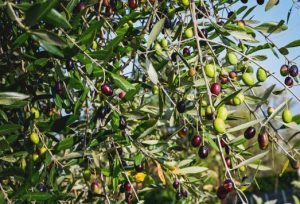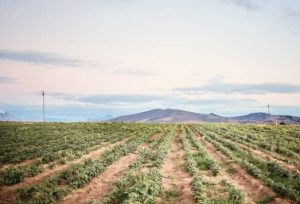Greek natural resources
Greece is home to diverse and abundant natural resources that play a crucial role in the country’s economy and culture. From fertile land and mineral deposits to renewable energy sources, Greece has an array of natural resources that have been utilized by its people for centuries.
 Greece’s natural resources are diverse and contribute significantly to its economic development. From land suitable for agriculture to mineral reserves and renewable energy sources, these resources have been utilized throughout history to support the livelihoods of its people. Understanding these natural resources will give us a better appreciation of this beautiful country and how it has prospered over time.
Greece’s natural resources are diverse and contribute significantly to its economic development. From land suitable for agriculture to mineral reserves and renewable energy sources, these resources have been utilized throughout history to support the livelihoods of its people. Understanding these natural resources will give us a better appreciation of this beautiful country and how it has prospered over time.
With nearly 80% of its land covered by mountains, Greece has limited arable land. However, the areas suitable for agriculture are highly productive due to the country’s warm climate and fertile soil. Olive groves, vineyards, citrus orchards, and wheat fields are some of the main crops grown in Greece.
Apart from agriculture, forestry also plays a significant role in the country’s economy. The mountainous landscape provides ideal conditions for growing trees and forests cover about one-third of the total land area in Greece. These forests not only provide timber but also contribute to environmental preservation through carbon absorption.
One of the most significant contributors to the Greek economy is tourism. With stunning beaches, historical sites, and unique landscapes, Greece has long been a popular destination for travelers from all over the world. This sector accounts for almost 20% of the country’s GDP and provides employment opportunities for millions of people. The natural beauty of Greece plays a crucial role in attracting tourists and generating revenue for the country.
Another essential resource that has impacted the Greek economy is agriculture. The fertile land and favourable climate allow for a diverse range of crops to be grown in Greece. Olive oil production is one of Greece’s top exports, with the country being one of the largest producers in the world. Other important crops include grapes for wine production and various fruits such as peaches, cherries, and oranges. Agriculture also supports many rural communities, providing income opportunities beyond urban areas.
Furthermore, Greece is home to vast deposits of minerals such as bauxite, nickel, iron ore, lead-zinc-silver-copper ores and lignite coal – which are all used extensively by industries both domestically and internationally. These mineral resources play an essential role in supporting industrial activities such as steel production, cement manufacturing, power generation, and more.
In recent years there has been a sharp decline in mining activity due to environmental concerns; however it still remains an important contributor to GDP through secondary industries processing raw materials into finished goods readying them for exportation.
The energy sector also plays a vital role in powering Greece’s economy with its abundant renewable energy resources including hydroelectric power plants hosting some fifteen percent (15%) electricity needs while geothermal operates geothermally powered pumps, wind energy systems and solar panels for natural storage of heat and electric energy. Energy production is also a major source of employment in Greece, providing job opportunities across various sectors.
The natural resources of Greece continue to have a significant impact on its economy. These resources provide employment, generate revenue and support key industries such as tourism, agriculture, mining, and energy. As the country continues to develop sustainable practices and investments in these resources, it is expected that they will play an even more crucial role in driving economic growth in the future.
Agricultural Resources

Agriculture has been a vital part of Greece’s economy and culture for thousands of years. The country’s rich soil, favorable climate, and abundant water resources make it an ideal location for farming. In fact, agriculture is one of the main contributors to the Greek GDP, with about 25% of its land used for agricultural purposes.
Greece’s diverse terrain allows for a wide variety of agricultural products to be cultivated throughout the country. The northern region is known for its wheat, corn, and tobacco production while the southern regions produce olive oil, citrus fruits, and vegetables. The fertile valleys in central Greece are home to vineyards and orchards producing grapes, apples, peaches, and cherries.
One of Greece’s most famous agricultural products is olive oil. With over 132 million olive trees covering more than half of the country’s total arable land, Greece is the third-largest producer of olive oil in the world. Olive cultivation has been an integral part of Greek culture since ancient times and continues to play a significant role in today’s economy.
Citrus fruits such as oranges, lemons, mandarins are also major exports from Greece. These fruits thrive in the Mediterranean climate along with other subtropical crops like figs and pomegranates. Additionally, grapes are grown extensively throughout Greece with wine production being a significant contributor to the economy.

Livestock rearing also plays a crucial role in maintaining balance within Greece’s agricultural industry. Cattle breeding is common throughout rural areas while pigs are mostly raised near larger cities due to their demand for pork meat consumption.
In recent years, organic farming has gained popularity in Greece, with more and more farmers turning towards this sustainable form of agriculture. This shift has led to a significant increase in the production of organic fruits, vegetables, and dairy products.
Greece’s agricultural resources are diverse and abundant. The country’s fertile land, favorable climate, and traditional farming practices contribute to the production of high-quality agricultural products that are enjoyed both domestically and internationally.
Crops grown in Greece
Greece is a country that has been blessed with a diverse climate and rich soil, making it an ideal location for agriculture. Due to its geographical location and varying topography, Greece has a wide range of crops that are grown throughout the country. In this section, we will explore some of the major crops grown in Greece.
Olives – The olive tree is considered to be one of the most important crops in Greece, both economically and culturally. It has been cultivated in the Mediterranean region for thousands of years and plays a significant role in Greek cuisine. Greece is known as one of the largest producers of olives and olive oil, with over 132 million olive trees covering almost half of its agricultural land.
Grains – Wheat is one of the main grains grown in Greece, especially in northern regions where the climate is more suitable for its cultivation. Other grains such as barley, corn, and oats are also commonly grown in different parts of Greece.
Citrus Fruits – Oranges, lemons, and grapefruits are some of the citrus fruits that thrive in Greece’s warm climate. These fruits not only provide essential vitamins but also contribute significantly to the country’s economy through exports.
Vegetables – A variety of vegetables are cultivated throughout Greece due to its favourable climate conditions. Some popular vegetables include tomatoes, cucumbers, eggplants, peppers, zucchini, and onions.
Dairy Products – With an abundance of fertile land available for grazing animals like sheep and goats, dairy farming is prevalent in Greece. As a result, high-quality dairy products such as feta cheese have become staples in Greek cuisine.
Wine – Winemaking has been an integral part of Greek culture since ancient times when Dionysus was worshipped as god for wine production! Today there are several wine-producing regions across the country that produce various varieties such as white Assyrtiko from Santorini and red Agiorgitiko from Nemea.
Herbs and Spices – Greece’s warm climate and fertile land have made it an ideal location for growing herbs and spices such as oregano, thyme, rosemary, and sage. These not only add flavor to Greek cuisine but also have medicinal properties.
Unique agricultural practices
Greece has a long history of agriculture, dating back to ancient times. The country’s diverse landscape and climate have shaped unique agricultural practices that are still in use today. From the mountainous regions to the coastal areas, Greece’s natural resources have played a crucial role in shaping its agriculture.
One of the most notable and well-known agricultural practices in Greece is olive cultivation. Olive trees cover about 60% of cultivated land in Greece, making it one of the largest producers of olive oil in the world. This practice dates back to ancient times, where olives were not only used for their oil but also as a symbol of peace and prosperity. The Mediterranean climate, with its mild winters and hot summers, provides ideal conditions for growing olives. Therefore, it is no surprise that Greece produces some of the highest quality olive oils globally.
Another unique agricultural practice in Greece is beekeeping. With vast fields full of wildflowers and herbs, beekeeping has become an essential part of Greek agriculture. Honey production is not only a significant contributor to the economy but also plays a vital role in pollination for other crops such as fruits and vegetables. In recent years, there has been a rise in organic beekeeping methods using traditional techniques passed down through generations.
In addition to these traditional agricultural practices, Greece’s rich biodiversity also allows for unique crops to be grown on its soil. For example, saffron cultivation can be found mainly on the island of Kozani due to its suitable microclimate for growing this precious spice. Saffron has been used since ancient times as both a culinary ingredient and medicine due to its numerous health benefits.
The country’s mountainous terrain also contributes significantly to its diverse agriculture by providing ideal conditions for grazing livestock such as sheep and goats. This type of farming known as transhumance involves moving animals between different pastures throughout the year depending on weather conditions and vegetation growth cycles.
Moreover, vineyards are also a significant part of Greek agriculture, with wine production dating back to 4000 BC. The country’s mild climate and fertile soil allow for the cultivation of various grapes, producing some of the finest wines globally. Greece’s unique grape varieties, such as Assyrtiko and Agiorgitiko, have gained international recognition and are must-try for any wine lover.
In recent years, there has been a resurgence in organic farming practices in Greece. With its abundance of natural resources and traditional techniques passed down through generations, many farmers have turned to sustainable methods of agriculture. This includes using natural fertilizers and pesticides, promoting biodiversity on their lands, and preserving the rich cultural heritage of Greek agriculture.
Greece’s natural resources have played a vital role in shaping its unique agricultural practices. From olive cultivation to beekeeping, saffron production to transhumance farming, each practice is deeply rooted in the country’s history and heritage. With a renewed focus on sustainability and traditional methods, Greek agriculture continues to thrive while preserving its cultural identity.
Mineral deposits

One of the most significant mineral deposits in Greece is bauxite, which is mostly located on the island of Milos in Cyclades. Bauxite is a key component in aluminium production and makes up about 60% of Greek exports. Another major deposit is magnesite, a mineral used for fireproofing material and steel production. It can be found on Mount Pelion in central Greece.
Greece also has considerable reserves of lignite coal distributed across various areas such as Western Macedonia and Megalopolis Basin in Peloponnese. Lignite plays a vital role as fuel for electricity generation and accounts for approximately 70% of Greek energy consumption.
In addition to these major deposits, there are also significant amounts of nickel, chromite, lead-zinc-silver ores, iron ore (magnetite), gold-copper porphyry-type ore bodies scattered throughout different parts of mainland Greece. These minerals have been commercially exploited since ancient times but have gained even more attention with modern mining technology.
Apart from metallic ores, industrial minerals such as salt deposits (in Thrace) and sulphur deposits (in the Aegean islands) are also essential resources for Greece. Salt is used in various industries, including food production and chemical manufacturing, while sulphur is a vital component in fertilizers and pharmaceuticals.
The mineral resources of Greece have played a crucial role in its economic development, contributing significantly to its GDP. The country’s mining sector employs over 30,000 people and accounts for about 3% of its GDP. Furthermore, these resources provide raw materials for the country’s industrial sector, which makes up a significant portion of its economy.
Greece’s mineral deposits are diverse and abundant, with a long history of exploitation. These valuable resources not only contribute to the country’s economy but also play an essential role in meeting domestic and global demands for industrial minerals. As technology advances and demand increases, it is expected that Greece’s mineral wealth will continue to be a significant contributor to its economic growth.
Major minerals extracted and their uses
Greece is a country rich in natural resources, including various minerals that have been extracted and utilized for centuries. These minerals play an important role in the economy of Greece and are essential for a variety of industries. In this section, we will discuss some of the major minerals found in Greece and their uses.
Bauxite
Bauxite is one of the most abundant mineral resources in Greece, with estimated reserves of over 100 million tons. It is primarily used to produce aluminium, which has a wide range of applications such as construction, transportation, packaging, and electrical equipment. The mining of bauxite takes place mainly in central Greece on the island of Evia and the Peloponnese region.
Lignite
Lignite is another important mineral found in abundance in Greece. It is a low-grade coal that is used for electricity generation, heating systems, and industrial processes. The largest lignite deposits are located in northern Greece, particularly in the regions of Western Macedonia and Thrace.
Zinc and Lead
The Lavrion Mine complex near Athens was once one of Europe’s largest mines producing zinc and lead ores. These minerals are used extensively in manufacturing batteries for cars, electronic devices, construction materials such as roofing sheets and pipes, as well as for galvanizing steel products.
Nickel
Greece holds significant reserves of nickel ore deposits on the island of Chios which have been mined since ancient times by civilizations like Phoenicians or Romans who used it to make coins because it was known to be quite resistant to corrosion under normal conditions.
Potash
Potash is an essential element used primarily as fertilizer but also has other industrial applications such as glassmaking or water softening agents due to its high solubility properties making it ideal for agricultural use where soil pH balance needs adjustment before planting crops like wheat fields irrigated with calcium-rich irrigation water from nearby rivers.
Perlite
Perlite is a volcanic rock that is mainly found on the island of Milos in Greece. It is used as a lightweight aggregate in construction, horticulture, and insulation materials due to its high insulating properties and low density.
Marble
Greece is famous for its marble, with some of the most sought-after types being white marbles like Thassos or Pentelikon. Marble has been used since ancient times for sculptures, buildings, and monuments due to its beauty and durability.
Aeolic and Solar Energy

Additionally, Aeolic and solar energy offer a reliable source of electricity that is not dependent on finite resources like coal or oil. This means increased energy security for the country, reducing its reliance on imported fuel.
Moreover, integrating Aeolic and solar power into the grid helps diversify Greece’s energy mix, promoting resilience and stability in the face of fluctuating fuel prices. It also creates new job opportunities in the renewable energy sector, contributing to economic growth and innovation.
Greece’s abundant sunshine has been utilized for centuries, with architectural marvels like the Parthenon designed to optimize natural light and warmth. Fast forward to modern times, where Greece has made significant strides in incorporating Aeolic and solar energy into its power grid.
The country has embraced these sustainable alternatives as part of its commitment to reducing carbon emissions and promoting environmental sustainability. With advancements in technology and infrastructure, Greece is well-positioned to continue expanding its renewable energy capacity in the years ahead.
Current Usage and Development
Greece, known for its stunning landscapes and abundant sunshine, is making significant strides in harnessing renewable energy sources like Aeolic and solar power.
In recent years, there has been a noticeable increase in the usage of wind turbines and solar panels across the country. These technologies are being integrated into both residential and commercial buildings to reduce dependence on non-renewable energy sources.
The Greek government has also been proactive in promoting the development of Aeolic and solar energy through various initiatives and incentives. This support has led to a growing number of projects aimed at expanding renewable energy infrastructure.
With advancements in technology and decreasing costs, more people are turning to aeolic and solar energy as viable alternatives to traditional forms of electricity generation. The shift towards cleaner energy not only benefits the environment but also contributes to Greece’s goal of achieving greater energy independence.
Challenges and Limitations
As with any renewable energy source, Aeolic and solar energy in Greece face their fair share of challenges and limitations. One key challenge is the intermittency of these energy sources, as they rely on weather conditions for optimal performance. This means that during periods of low wind or sunlight, there may be a decrease in energy production.
Another limitation is the initial high cost of setting up Aeolic and solar power systems. While these costs have been decreasing over the years due to advancements in technology, it still presents a barrier for many individuals or businesses looking to invest in renewable energy.
Moreover, the issue of land use also arises when it comes to large-scale implementation of Aeolic and solar projects. Finding suitable locations for wind turbines or solar panels without causing environmental disruptions can be a challenge.
Additionally, grid integration poses a challenge as well. Ensuring that the electricity generated from Aeolic and solar sources can efficiently integrate into the existing power grid requires careful planning and infrastructure upgrades.
Despite these challenges and limitations, ongoing research and development efforts aim to overcome these obstacles to further promote sustainable energy practices in Greece.
Government initiatives for sustainable energy
The Greek government has recognized the importance of sustainable energy and has implemented several initiatives to promote it. These initiatives aim to reduce Greece’s reliance on fossil fuels, decrease carbon emissions, and transition towards a more environmentally friendly and sustainable energy system.
One of the main initiatives is the Renewable Energy Sources (RES) Law, which was introduced in 2011. This law sets targets for renewable energy production and provides incentives for businesses and individuals to invest in renewable energy sources such as wind, solar, hydro, and geothermal power. It also established a feed-in tariff system that guarantees a fixed price for renewable energy producers for a set period of time.
This has encouraged private investment in renewable energy projects and has helped Greece increase its share of renewable energy in total electricity generation from 9% in 2005 to over 30% in recent years. Furthermore, the Greek government launched the National Energy Efficiency Action Plan (NEEAP) in 2014.
The plan aims to reduce primary energy consumption by 20% by 2020 through measures such as improving building insulation, promoting efficient heating systems, and encouraging the use of electric vehicles. The NEEAP also includes financial incentives for households and businesses to adopt energy-efficient practices. In addition to these national initiatives, Greece is also actively involved in international efforts towards sustainability.
In line with the European Union’s goals for reducing greenhouse gas emissions by at least 40% by 2030 compared to 1990 levels, Greece has committed to increasing its share of renewables to at least 35% by that same year. Moreover, Greece is part of numerous international agreements aimed at addressing climate change and promoting sustainable development. For example, it is a signatory of the Paris Agreement on Climate Change which aims at limiting global temperature rise well below two degrees Celsius above pre-industrial levels.
The Greek government has also taken steps towards promoting sustainable transportation through initiatives such as subsidizing electric and hybrid vehicles, implementing a network of electric vehicle charging stations, and promoting the use of public transportation. These efforts not only reduce carbon emissions but also contribute to improving air quality and reducing dependence on fossil fuels.
Greece’s government initiatives for sustainable energy are crucial steps towards achieving a more sustainable future. Through these measures, Greece is not only reducing its environmental impact but also investing in renewable energy sources that will ultimately lead to long-term economic benefits for the country.
Marine Resources
With over 13,000 kilometres of coastline, Greece boasts the 11th longest coastline in the world, making it a prime location for various marine activities such as fishing, aquaculture, and tourism.
Fishing has long been a vital part of Greek culture and economy. The country’s rich waters are home to over 700 species of fish, including sardines, anchovies, tuna, and swordfish. In fact, Greece is the second-largest producer of sea bass and sea bream in Europe. The traditional fishing industry still plays a significant role in many coastal communities, where small-scale fishermen use sustainable methods to catch fish. These techniques not only ensure the preservation of fish populations but also maintain the delicate balance of marine ecosystems.
Apart from traditional fishing methods, Greece has also embraced modern aquaculture practices. Aquaculture involves the farming of aquatic organisms such as fish and shellfish under controlled conditions. This industry has experienced tremendous growth in recent years and now accounts for nearly half of Greece’s total fisheries production. The favourable climate conditions along with strict regulations for sustainable farming make Greek aquaculture products highly sought after worldwide.
Aside from being an important food source for both locals and tourists alike, Greece’s marine resources also offer recreational opportunities. The crystal clear waters surrounding the country provide ideal conditions for scuba diving and snorkelling adventures. With numerous secluded coves and underwater caves to explore along with vibrant marine life to discover, these activities have become increasingly popular among visitors.
Moreover, tourism associated with marine activities contributes significantly to the Greek economy. Coastal resorts offer a variety of water sports such as sailing, windsurfing,
and jet skiing which attract thousands of tourists each year.
However, the exploitation of these resources must be carefully managed to ensure their sustainability for future generations. Greece has implemented strict regulations to protect its marine life, including the establishment of marine protected areas and banning destructive fishing practices.
Greece’s marine resources are a vital part of its natural wealth and play an integral role in the country’s economy. Whether it be through fishing, aquaculture, or tourism, these resources are essential for both locals and tourists alike. With proper management and conservation efforts, Greece’s marine resources will continue to thrive for years to come.
